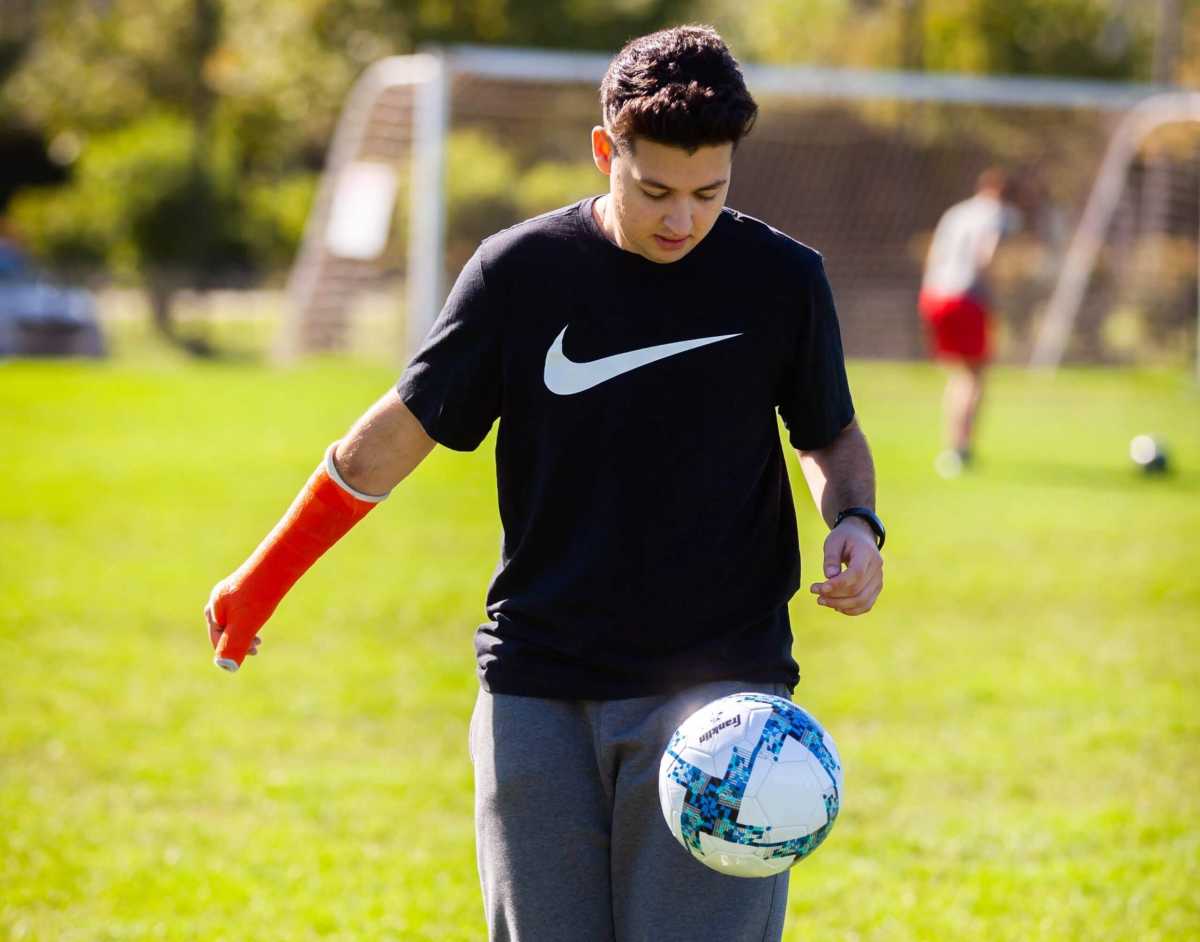Sivan Kotler-Berkowitz has played soccer since he was five years old. He started out on a girls’ team, but in the seventh grade, he transitioned to being a boy and joined the boys’ team. Last year, before his high school graduation, he advocated for transgender athletes at the United States Department of Education.
Kotler-Berkowitz, 18, just graduated from his Massachusetts high school. He will head to Syracuse University in the fall to study towards becoming a special education teacher. He’s not sure if he will join a soccer team in college, but he is sure of the important role sports played in his life when he was growing up.
“Sports has meant so much. I honestly don’t think I would be the person I am today without sports,” Kotler-Berkowitz said. “It’s such a crucial part of our life. I truly learned so much from sports.”
Sivan Kotler-Berkowitz’s twin brother, Lev Kotler-Berkowitz, also plays sports. He plays baseball and has advocated for transgender athletes alongside his brother.

Sivan Kotler-Berkowitz listed off what he learned by playing sports: teamwork, winning, working through losses to rebound, leadership, discipline, confidence, inspiration, and being your whole self.
Anne Lieberman, director of policy and programs at Athlete Ally, who uses they/them pronouns, agreed, adding that transgender athletes learn how “to connect with their bodies and find healthy outlets for stress.” Studies have found transgender athletes do better in school, like their peers, and are at a lower risk for attempted suicide, they added.
“We know the end benefits of youth sports for all kids, and to deny kids access to something that is a fundamental part of growing up is cruel,” Lieberman said, citing the explosion of anti-transgender sports bills culminating in 67 pieces of legislation in 31 states, according to Trans Legislation Tracker.
Athlete Ally is a New York City-based national organization working to end homophobia and transphobia in sports and activate the athletic community to exercise their leadership to champion LGBTQI+ equality, according to its website.
Legislative bullying
In total, there have been 557 anti-transgender bills proposed in 49 states, according to Trans Legislation Tracker. Among the bills 87 have passed and 106 have failed in State Legislatures. That doesn’t include the two federal bills, including an anti-transgender sports bill, H.R. 734, and H.R. 5, the Parents Bill of Rights Act, which would require schools to out students to their parents. Trans Legislation Tracker is tracking 364 anti-transgender bills.
According to the American Civil Liberties Union, there are a total of 491 anti-LGBTQ bills attacking queer and gender diverse people’s civil rights, free speech and expression, health care, government-issued identification, public accommodations, schools and education, and other aspects of LGBTQ people’s lives in legislatures across the US.
“Since 2020, we’ve seen 23 states pass bills that ban trans, nonbinary, and intersex youth from playing sports. That’s almost half the country,” Lieberman told Gay City News. “Many of the states that proposed and passed these bills could not name a single trans athlete in their state, and if they could it was one or two.”
Lieberman said transgender youth are being used as “political footballs,” particularly “trans women and girls and their participation in sports.”
Public schools are not the only institution on the legislative agenda for anti-transgender sports bills. Lieberman pointed out that anti-transgender lawmakers and their constituents are also targeting college athletics and private institutions such as private schools as well as YMCA and Boys and Girls Clubs, depending on the state down to the school districts.
Lawmakers overlooked the fact that the National Collegiate Athletics Association (NCAA) and other college governing bodies have transgender inclusion policies in place, Lieberman said.
Negative impact
Speaking with Gay City News, Lieberman cited studies pointing to the severity of the impact of anti-transgender sports bills and overall anti-LGBTQ legislation on transgender youths’ mental health. A study that was published by the Clinical Practice in Pediatric Psychology last year reported the anti-transgender bills are causing stress and trauma from feelings of being a burden to their families, schools, and teammates; increased anxiety; and hyper-vigilance.
Like many others, Kotler-Berkowitz is upset about the anti-transgender sports laws.
“Sports are such an important part of so many people’s lives, and to be not allowed to do something simply because of who we are, it’s sad and it’s upsetting,” he said.
Harmful intent
In another report published last year, The Trevor Project found disproportionately high rates of suicide among transgender, nonbinary, youth questioning their gender identity.
Lieberman pointed out that anti-transgender sports bills have empowered adults to harass and out transgender athletes on social media.
“One of the scariest things we’re seeing is this rise of social media accounts really run by adults targeting children,” they said.
Recently, two young transgender women who were bullied and threatened pulled out of their track meets, Lieberman said, declining to give too many details to protect the privacy of the athletes and their families.
“There was a fear that people were going to show up at their track meet and their parents and the kids made the decision not to participate because they were really afraid of violence and being targeted,” they said. No one showed up at the meet, but “the damage was already done.”
“The kids had already been intimidated, terrified, targeted, harassed, [and] bullied out of participating in a school sport,” they said.
Transgender girls and women have received the brunt of the attacks on transgender athletes, especially when it comes to Title IX protections for cisgender women.
For the 50th anniversary of Title IX last year, President Joe Biden boosted protections for women, but excluded transgender athletes.
Kotler-Berkowitz doesn’t see the difference between cisgender and transgender athletes and doesn’t believe opponents’ arguments are valid, he said.
“I think people have this misconception that trans athletes, specifically trans girl athletes, are trying to take over and dominate,” he said. “We’re really just trying to play like everyone else. We’re just trying to have fun and be on a team.”
Speaking out
This is why Kotler-Berkowitz spoke out along with other sports allies and transgender athletes before the US Department of Education in November 2022. Their goal was to help shape the department’s policy on transgender student athletes and Title IX, and Kotler-Berkowitz said he sought to tell “them what sports mean to us and show them that this is who we are.”
In a joint May 17 news release, the National Center for Lesbian Rights, GLBTQ Legal Advocates & Defenders, The Trevor Project, and many other organizations applauded a transgender inclusive Title IX policy update from the Biden administration. NCLR is currently challenging Arizona and Utah’s state laws banning transgender students from school sports.
Kotler-Berkowitz believes people simply need to get to know transgender athletes. If they know the athletes, they will have a better understanding of transgender people playing sports.
He started playing soccer as a girl in a girls’ recreational community league when he was five years old, Kotler-Berkowitz said. He went on to play for different travel and club teams until high school when he joined the school team, transitioning along the way from a girl to a boy.
“When I was in seventh grade, I told my parents my truth, I told them who I was: a boy,” he said. That also meant leaving the girls’ team and joining the boys’ team.
“When I’m on the field [and] when I’m with my team, I’m just another player,” he said. “The fact that I’m transgender — it does not matter at all. I’m just like everyone else trying to have fun with my team [and] working towards one common goal.”
However, he did fear losing being able to play soccer, where he played center field, by not being accepted or legally being allowed to play.
“I didn’t want to lose soccer,” Kotler-Berkowitz said. “I knew this was the right thing to do. I knew I had to do this for me.”
At the same time, he said, “I didn’t want this big part of my life to be taken away just because of who I was.”
None of his fears came true, not that he didn’t get questioned occasionally, he said.
Kotler-Berkowitz said when he encountered questions, he would tell his teammates, “I happen to be transgender. That is who I am. I’m just a boy. I’m just here to play soccer, like all of you.”
“It really clears up pretty quickly and they see that I’m just like them,” he said, adding that he was received well by his teammates.
Kotler-Berkowitz also didn’t have to worry legally about whether he would be banned from playing or not. Massachusetts, where he lives, has protected transgender athletes since 2012. Last month, the Bay State’s attorney general co-led a multi-state coalition of attorneys general to strengthen protections for transgender athletes, according to a May 18 news release from the Massachusetts Attorney General’s Office.
This is why Kotler-Berkowitz feels it’s important for him to speak out about transgender kids playing sports where others may not have the freedom to play or speak out.
On April 6, the department released its new policy barring blanket bans on transgender athletes from playing school sports, with some leeway for schools to develop team eligibility criteria to serve educational objectives “such as ensuring fairness in competition or preventing sports-related injury.” At the same time, the policy doesn’t deny transgender athletes’ opportunities to play on teams consistent with their gender identity from elementary school through college.
The department’s goal is to limit the harm done to transgender athletes.
Need help talking about transgender athletes? HRC created a chatbot to help people talk about transgender youth playing sports. Athlete Ally also provides resources for youth, families, schools, and sports leaders.


































